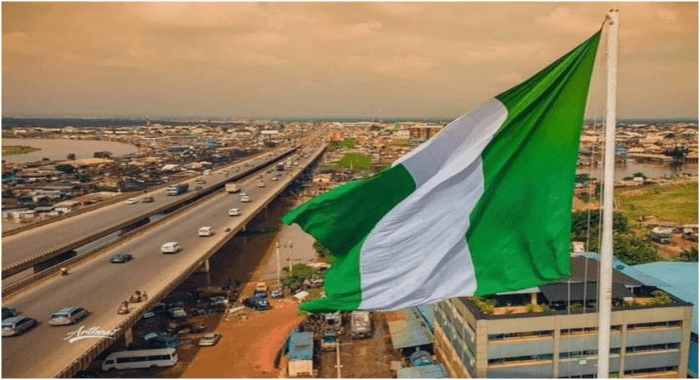Democracy & Governance
The Hope for Nigerians: Charting the Path to our Eldorado through Overcoming Prejudice for the Ideal Practices of Democracy in Nigeria on June 12 Democracy Day, Under President Tinubu Watch -By Oyindamola Samuel Boladale
International cooperation and support can also play a vital role in Nigeria’s democratic journey. The international community can provide technical assistance, share best practices, and support capacity building initiatives to strengthen democratic institutions and practices.

The Hope for Nigerians: Charting the Path to Our Eldorado through Overcoming Prejudice for the Ideal Practices of Democracy in Nigeria on June 12 Democracy Day, Under President Bola Ahmed Tinubu Watch.
Nigeria, a nation known for its vast resources and vibrant cultural diversity, holds immense potential for growth and development. However, the journey towards realizing the collective dreams and aspirations of Nigerians has been hindered by various challenges, including prejudice and the struggle to establish ideal democratic practices. June 12 Democracy Day, commemorating the annulled presidential election of 1993, serves as a poignant reminder of the nation’s commitment to democratic governance. while delving into the profound hope that Nigerians hold, envisioning a path to our collective “Eldorado” by overcoming prejudice and embracing the ideal practices of democracy. I explore the historical significance of June 12, analyze the impact of prejudice on democratic ideals, and propose strategies for fostering inclusivity, citizen participation, and equitable governance.
The Historical Significance of June 12 Democracy Day in Nigeria: June 12, 1993, marked a watershed moment in Nigeria’s history when millions of Nigerians cast their votes in a free and fair presidential election. However, the results were subsequently annulled, sparking widespread protests and serving as a catalyst for the struggle towards democratic consolidation. The commemoration of June 12 as Democracy Day is a testament to the nation’s unwavering commitment to democratic governance and symbolizes the hope for an inclusive and just society.
Prejudice as a Barrier to Ideal Democratic Practices: Prejudice, whether based on ethnicity, religion, gender, or socio-economic status, undermines the fabric of Nigerian society and hampers the progress towards an ideal democracy. Discrimination and bias within political processes marginalize certain groups, hinder inclusivity, and impede the establishment of equitable governance. Overcoming prejudice requires a collective effort to promote tolerance, understanding, and respect for diversity, fostering a society where every Nigerian’s voice is heard and valued.
However, the hope for Nigerians is now centered around President Bola Ahmed Tinubu’s regime with the potential for fostering inclusive governance, overcoming prejudice, and realizing the ideals of democracy in Nigeria. Tinubu’s leadership can serve as a catalyst for positive change, setting a precedent for democratic practices and empowering the Nigerian populace. The significance of June 12 as Democracy Day serves as a constant reminder of the nation’s democratic aspirations and the need to uphold the values it represents.
One of the key factors that can contribute to the advancement of democracy in Nigeria under Tinubu’s leadership is the promotion of citizen participation. A thriving democracy requires active engagement and involvement from the citizens. Tinubu’s regime can encourage and facilitate opportunities for citizens to have their voices heard, whether through public consultations, participatory decision-making processes, or inclusive policies that prioritize the needs and concerns of the people
Furthermore, strengthening the rule of law is crucial in ensuring democratic stability and protecting citizens’ rights and freedoms. Tinubu’s administration can prioritize judicial reforms, invest in the training and capacity building of judges and legal professionals, and ensure that the legal system operates independently and impartially. By establishing a robust and fair legal framework, the rule of law can be upheld, providing a solid foundation for democratic governance.
Empowering the Nigerian populace is another essential aspect of Tinubu’s regime. This can be achieved through initiatives that promote education, entrepreneurship, and access to basic services. By investing in education, particularly in marginalized communities, the regime can equip citizens with the knowledge and skills necessary to actively participate in democratic processes. Additionally, economic empowerment programs and poverty alleviation measures can help create a more equitable society, reducing social disparities and promoting social cohesion.
Nevertheless, the road to achieving these democratic ideals is not without challenges. Nigeria faces several obstacles, including political polarization, corruption, ethnic and religious tensions, and weak institutions. Overcoming these challenges requires a collective effort from both the leadership and the people. Tinubu’s regime must demonstrate strong leadership and commitment to democratic values, while the citizens need to actively engage in civic activities, hold their leaders accountable, and promote dialogue and tolerance across diverse communities.
International cooperation and support can also play a vital role in Nigeria’s democratic journey. The international community can provide technical assistance, share best practices, and support capacity building initiatives to strengthen democratic institutions and practices. Engaging in partnerships with international organizations and democratic nations can contribute to the exchange of ideas and experiences, fostering an environment of learning and collaboration.
In conclusion, the hope for Nigerians in Tinubu’s regime lies in the potential for fostering inclusive governance, overcoming prejudice, and realizing the ideals of democracy in Nigeria. The significance of June 12 as Democracy Day serves as a constant reminder of the nation’s democratic aspirations. By promoting citizen participation, strengthening the rule of law, and empowering the Nigerian populace, Tinubu’s leadership can usher in positive change and set a precedent for democratic practices. However, the road to achieving these ideals is not without challenges, and a collective effort from both the leadership and the people is necessary for the advancement of democracy in Nigeria.
Oyindamola Samuel Boladale known as THE MANDELA OF AAUA is a studier of POLITICS, A writer, Content creator and a lover of Politics from the department of Political science, AAUA.
Continue Reading









